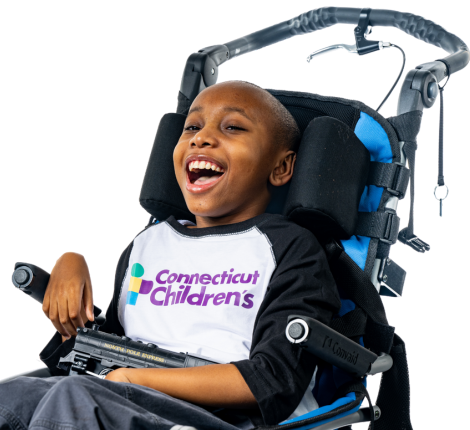Facing the future with positivity and laughter
Twelve-year-old Jackson was born with metachromatic leukodystrophy (MLD), a rare genetic condition that affects the central and peripheral nervous system. His development was normal at first, but by the time Jackson turned three, his parents had begun to notice some developmental issues. It had taken him a little longer to walk. He wasn’t as socially adept as other kids at daycare. After consulting with various specialists and undergoing a series of tests, they finally received the diagnosis. It was a hard blow. “It was something that we did not expect,” Jackson’s father, Keith, said. “Obviously, no one does. It was a very quiet ride home that day.”
Relocating for a stem cell transplant
Currently, there is no cure for MLD, but a stem cell transplant held the potential to slow the disease’s progression. Jackson and his parents packed up and moved to Pittsburgh for eight months, where the procedure could be done. Unfortunately, Jackson’s white blood cells attacked the stem cells, and none of them survived. Jackson’s doctors in Pittsburgh believed that his body was strong enough to try a second stem cell transplant. This time, the procedure worked.
Today, Jackson is 12. He attends seventh grade and loves slapstick comedy, funny books, cars and trains. He still sees a range of specialists at Connecticut Children’s, including pediatric neurologist Gyula Acsadi, MD, PhD, Division Head of Neurology. He receives physical therapy, occupational therapy and speech therapy at Connecticut Children’s Specialty Care Center in Farmington. He also receives care from the Pain & Palliative Medicine division, where Mallory Fossa, APRN, and the team have been instrumental in helping Jackson and his parents improve his quality of life.
Hope and acceptance
MLD causes a progressive decline in motor and cognitive functions, so Jackson and his parents face a future filled with many unknowns. While they hold out hope for a breakthrough in MLD treatment, they keep their focus firmly set on hope, acceptance and positivity.
“It took a while for us to truly accept what was happening. He couldn’t do certain things, and we saw that decline,” said Jackson’s mother, Chinenye. “We would say to ourselves, well, if he’s able to laugh and smile, we have to do the same. It took some adjustment. Yes, we know what’s happening, but having him with us is what truly matters. When I wake up and walk into his room and see him smiling at me, I can’t help but smile, give him a hug and a kiss. It carries me through the day. He gives us the strength. He gives us the feeling of hope and so we embrace it.”
“Laughter is getting me through this,” added Keith. “We’ve had dark moments. There’s no getting around that. That’s just going to be a part of it. If he can sit there and laugh and smile through it, we have no excuse to not be able to try to provide him with that. If we have to walk out of the room and shed our tears, then we do that. But we always find joy from his laughter.”
